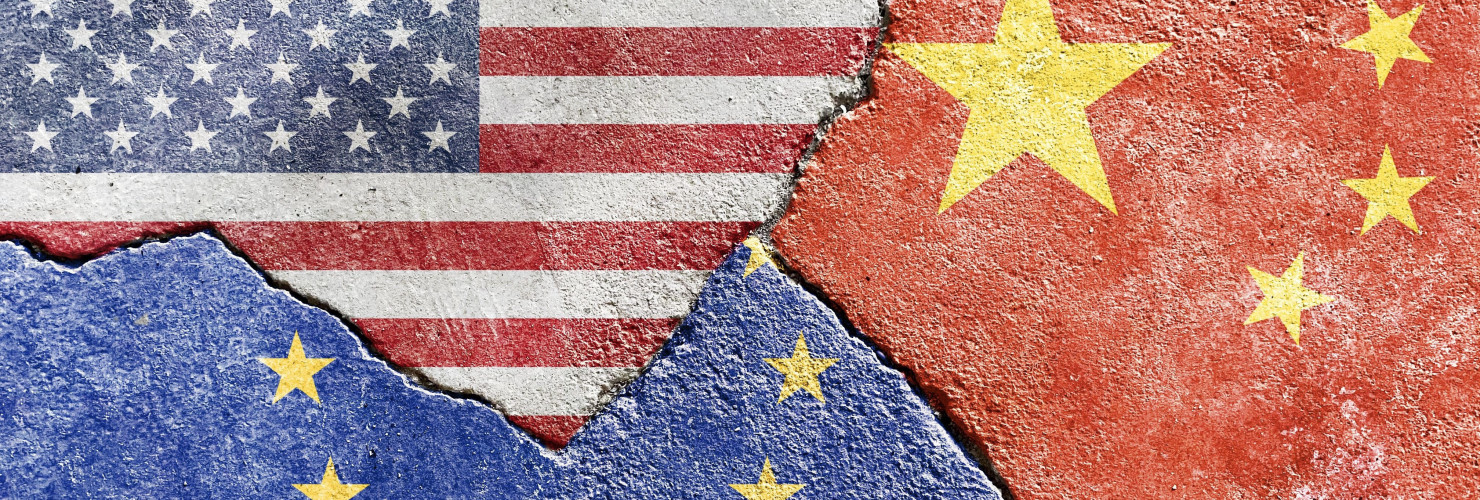

Beyond "Zeitenwende": US policies and the US-China conflict present Germany with historic challenges
You are reading the Germany chapter of the 2025 report of the European Think Tank Network on China (ETNC) "Quest for strategic autonomy? Europe grapples with the US-China rivalry". Go back to the main page.
In Germany, long-held certainties have been shaken since the new US administration under Donald Trump upended transatlantic relations. At the same time, German ties with China have further cooled, despite intensive trade and business links. Germany’s new government (a coalition of the conservative CDU/CSU and the Social Democrats) and German industry now face unprecedented pressure to navigate in a geopolitical world amid an ongoing polarization of society at home.
Recent trends in Germany’s relationship with the US: No more business as usual
For Germany—perhaps even more so than for the rest of Europe—US Vice President J.D. Vance’s speech at the Munich Security Conference in February 2025 marked a historic turning point. Vance’s verbal attack—which involved interfering in German elections, praising far-right parties, and oddly denouncing Germany’s alleged ‘lack of’ freedom of expression—sparked outrage in German political circles. At the time, Defence Minister Boris Pistorius (SPD) called the statements “unacceptable,” while Chancellor Friedrich Merz, who at the time was in the final days of the election campaign, described Vance’s comments as “offensive” and expressed frustration at the questioning of democratic institutions.1
In the first months of the second Trump administration, transatlantic relations have come under the hardest test since the end of World War II. This has hit Germany particularly hard, given that much of its prosperity is built on US military protection and decades of close transatlantic security and economic cooperation – with Germany recording an export surplus in trade with the US since 1991.2 The unpredictable dynamic unleashed by Trump in the context of the war in Ukraine made it clear that maintaining a close alliance with Germany and Europe is no longer a priority for the US president.
For Germany, this historic U-turn occurred at a particular inopportune moment: in the midst of a federal election campaign in which parties focused on migration issues rather than foreign and security policy. Nevertheless, Merz has called for greater cooperation within a “self-confident” EU.3
In response to Trump’s apparent alignment with Russia, he stressed the need to engage in discussions with the two European nuclear powers, France and Great Britain, regarding nuclear sharing. “We must prepare for the possibility that Donald Trump will no longer uphold NATO’s mutual defence commitment unconditionally,” he stated in a media interview.4 Merz also called it a priority to “strengthen Europe step by step so that we achieve independence from the US”.5
Yet, the new coalition government remains committed to the transatlantic alliance and close cooperation with the US. Trump was among the first politicians Merz called after entering office. However, his diplomatic efforts to create more US-European alignment to end the war in Ukraine – for instance, by initiating a trip of France’s Emmanuel Macron and Britain’s Keir Starmer to Kiev and hoping for Trump’s support – have so far proved futile.6
Economically, relations between Germany and the US intensified in 2024. The US replaced China as Germany’s largest trading partner for the first time in nine years, with a trade volume of 252.8 billion euros, according to the German Federal Statistical Office.7 This was partly due to tensions with China, Germany’s long-standing largest trading partner. But in future, the tariffs threatened by the US, e.g., on steel and on products manufactured in Mexico, such as cars) could significantly impact German companies’ business with the US. Most German automakers, like Mercedes, VW, Audi and BMW, have factories in Mexico – the majority of vehicles produced there are exported to the USA.
Given the high level of economic dependence on the US, it is hardly surprising that representatives of the new German government have, so far, held off on any tougher verbal responses to Trump’s tariff announcements made on the ominous “Liberation Day” in April. Berlin still is hoping to reach some kind of agreement with Washington.8
Among German business leaders, however, there is significant uncertainty. VW CEO Oliver Blume9 announced that he intended to negotiate with Trump directly. Other leaders have responded to the looming risks posed by the protectionist measures by increasing their investments in the United States. According to media reports,10 the 40 DAX and 50 MDAX companies already spent nearly USD 43 billion (EUR 41 billion) on acquisitions and investments in US companies in 2024—an increase of almost USD 20 billion compared to 2023. BMW,11 for instance, announced investments of USD 1.7 billion in the US, among others into a pressing plant in the state of South Carolina.
While under the first Trump administration German–US economic ties remained relatively stable despite protectionist measures, German businesses now expect competitive disadvantages stemming from lower energy costs in the US, protectionist tariffs, and state subsidies for US companies. A recent survey also identified the indirect effects of a slowdown in global trade caused by US tariffs as a factor that could negatively impact German industry sales. Germany’s economy has been stagnant for almost three years,12 the implementation of US tariffs would worsen the situation and very likely induce a deeper recession.
Given the Trump administration’s anti-European stance, German politics now faces challenges it has long hoped to avoid:13 The potential long-term loss of the US as a security partner will necessitate that Germany and other European countries invest billions in their own security infrastructures. With the US potentially aligning with Russia on the Ukraine issue, Germany is under increasing pressure to quickly develop solutions with its European partners. This strategic reorientation of historic dimensions must be implemented in a challenging political environment, with right-wing extremist, anti-democratic parties on the rise both in Germany and elsewhere in the EU.
Trends in the relationship with China: More pragmatic approach, no pivot
With a view to the consequences of the Trump administration’s protectionist economic policy—with its tariff threats and export controls for high-tech products – Chinese diplomats have called on Germany14 to join forces with China and pursue common interests. Both nations rely heavily on exports to sustain their economic growth. However, the relationship between Berlin and Beijing has grown more complicated during the years of the so-called “traffic light” coalition government (2021-2025), comprising Social Democrats, Greens, and Liberals. The new government that entered into office on May 6 pursues a more pragmatic but still risk-conscious approach and has put forward suggestions for nuanced approaches to de-risking.
The first German China strategy, published in the summer of 2023 and developed under the leadership of the Green-led Foreign Ministry,15 defines China as a “partner, competitor, and rival” and places strong emphasis on the necessity of de-risking the bilateral relationship.
However, the China policy pursued by the SPD-led Chancellery was widely perceived in public debate as contradicting the strategy’s objectives. Notably, this included Chancellor Olaf Scholz’s decision in 2023 to allow the Chinese state-owned company COSCO to acquire a stake in a Hamburg port terminal—despite its status as critical infrastructure—and Germany’s vote against EU tariffs on electric vehicles from China. The frequency of mutual diplomatic visits reflects the complicated state of the Sino-German relationship: for instance, when Xi Jinping came to Europe in 2024, he avoided Germany. The German Chinese Dialogue Forum—an important civil society platform—had been on hold since the Covid-19 pandemic, with a meeting planned for 2024 ultimately cancelled by the Chinese side.
Although political contacts at the top level have become less frequent in recent years, at the subnational level requests for delegation visits have increased post-pandemic— primarily with an interest in touring the facilities of “hidden champions” in the regions, companies producing goods that China requires for its own industrial upgrading. Some Sino-German dialogue formats have also resumed, such as the one on scientific and technological cooperation held in June 2024 in Bonn. Since the beginning of 2025, there have reportedly been increased signs from China that it is willing to engage with German partners on challenging issues, such as mutual sanctions, and work toward a rapprochement. Since taking office, Merz and members of his cabinet also have been in touch with their respective Chinese counterparts, each side stressing an interest to continue the exchange and collaborate in dealing with “global challenges.”16
Economic cooperation between Germany and China remains robust, although several trends suggest that the situation may soon change17. According to the German Federal Statistical Office (Destatis), exports to China in 2024 fell by 7.6% to a value of EUR 90 billion18, while imports from the People’s Republic decreased by 0.3% to EUR 156.3 billion. Combined, the total trade volume with China amounted to EUR 246.3 billion.
The decline in German exports can be attributed to Beijing’s industrial policy, which is geared toward supporting its domestic innovative industries. Industries such as automotive, mechanical and plant engineering—as well as innovative sectors including green tech, medical technology, and ICT—are among those bolstered by Chinese state policies. Germany, traditionally strong in these sectors, is beginning to feel the pressure. There is growing recognition that recalibrating business strategies towards China is urgently necessary to safeguard domestic industries. “It is not five to twelve; it is twelve already,” as one industry representative remarked.
German companies are employing various strategies to tackle the challenges of shrinking market share and increasing competition from China. While large companies—and even medium-sized firms that wish to tap into the still lucrative Chinese market—are focusing on localization (“In China for China”), others are attempting diversification (“China Plus One”), seeking alternative markets and investment opportunities in the Asia-Pacific region. However, diversification has proved challenging for many German companies, prompting industry representatives to call for increased political support, for instance by expediting the negotiation of free trade agreements with other countries and regions.19
The German automotive industry, considered the backbone of the German economy, faces major disruptions in its China business due to growing competition from Chinese brands. The market share of German brands such as BMW, Mercedes, and VW has significantly dropped to 18.9% in 202420, compared to 26.2% in 2019. Chinese competition is increasingly extending to European and other third markets, as German carmakers have so far struggled to compete with moderately priced Chinese EV models.
Thus far, the industry continues to rely on China. The country is seen not only as a lucrative market, but also as a “fitness center” – as some top managers have put it – and an innovation hub that helps German companies stay competitive, in China but also in third countries worldwide.
According to a report by the consultancy Rhodium Group,21 it is still predominantly investments by German carmakers that are driving European foreign direct investment (FDI) in China. Consequently, some of the largest German companies might become even more dependent on China—contrary to the economic de-risking efforts pursued by Berlin and Brussels.
It is in particular the big German corporates view localization as a form of de-risking—a protective measure against geopolitical risks.22 Similarly, the argument that innovation can only thrive through collaboration with China is frequently advanced within the German scientific community.23 Nevertheless, the risks associated with such collaboration— for example, with scientific institutions linked to the Chinese military—are increasingly being discussed. The German government has also launched a series of initiatives aimed at improving China knowledge and risk awareness among scientists.24
In 2024, the dependence of German researchers on third-party funding from China became controversial when it was revealedthat several professors at RWTH Aachen University had allegedly received substantial funds for research in collaboration with Chinese military institutions.25 To date, the extent of third-party funding that German researchers and research institutions receive from China remains unknown, partly due to Germany’s federal structure and the far-reaching legal and financial autonomy of German universities.

